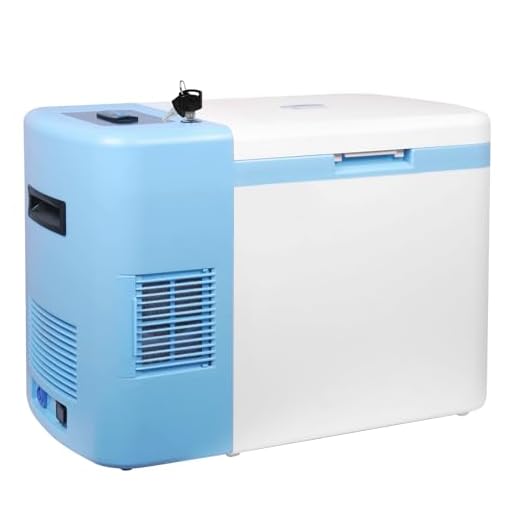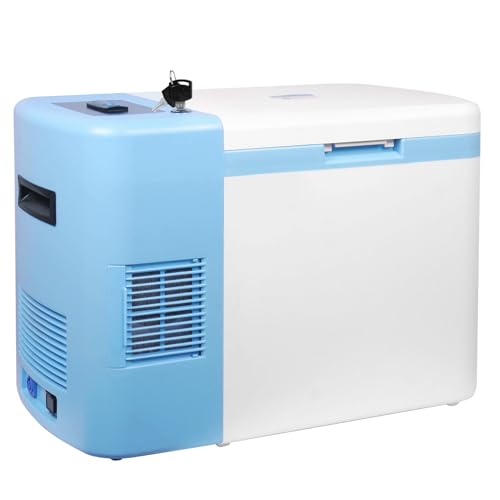



If you are a scientist or researcher working with nocodazole, you may be wondering how long this important compound can last in the freezer. Nocodazole is a widely used microtubule destabilizing agent that is commonly stored in laboratories and research facilities. It is known for its ability to disrupt microtubule dynamics, making it an essential tool in cell biology studies.
When it comes to the shelf life of nocodazole in the freezer, it is important to note that it can vary depending on the specific storage conditions. Generally, nocodazole remains stable and maintains its activity for a considerable amount of time when stored properly at ultra-low temperatures.
The recommended storage temperature for nocodazole is typically around -20 degrees Celsius (-4 degrees Fahrenheit) or lower. When stored under these conditions, nocodazole can often remain viable for several years. It is important to keep in mind that maintaining a consistent and controlled freezer temperature is crucial to ensuring the longevity of nocodazole.
However, it is always a good practice to periodically test the activity of stored nocodazole to ensure its effectiveness. Over time, the potency of the compound may gradually diminish, which can affect the reliability of experimental results. Regularly monitoring the efficacy of nocodazole can help researchers avoid potential complications and ensure the accuracy of their findings.
Understanding Nocodazole Storage
If you are using nocodazole in your research or experiments, it is important to understand how to properly store this compound to ensure its stability and effectiveness. Nocodazole is a microtubule disruptor commonly used in cell biology and cancer research. Here are some key points to keep in mind when it comes to storing nocodazole:
Temperature:
Nocodazole should be stored in the freezer at a temperature of -20°C (-4°F) or below. This low temperature helps to prevent degradation and maintain the chemical integrity of the compound. It is important to avoid repeated freeze-thaw cycles, as this can lead to the loss of potency.
Container:
When storing nocodazole, it is recommended to use a tightly sealed, airtight container to protect it from moisture and air exposure. This will help to prevent the degradation of the compound and maintain its stability over time.
Labeling:
Properly labeling the container with the name of the compound, concentration, and date of storage is essential for easy identification and proper inventory management. This will help ensure that you are using the correct batch of nocodazole and avoid any confusion.
Caution: It is important to handle nocodazole with caution, as it is a cytotoxic compound. Always follow proper safety protocols and use appropriate protective equipment when handling and storing nocodazole.
In conclusion, proper storage of nocodazole is crucial for maintaining its stability and efficacy. Storing nocodazole in a freezer at a temperature below -20°C, using a tightly sealed container, and labeling it correctly will help ensure its integrity and potency for future use in cell biology and cancer research.
Factors Affecting Nocodazole Shelf Life
The shelf life of nocodazole, a microtubule inhibitor commonly used in cell biology research, can be influenced by several factors. Understanding these factors is important for ensuring the effectiveness and reliability of the compound in experimental settings.
1. Temperature: Nocodazole should be stored at a temperature of -20 degrees Celsius (-4 degrees Fahrenheit) or below to maintain its stability. Freezing the compound helps to slow down the degradation process and extend its shelf life. It is essential to store nocodazole in a freezer to prevent the breakdown of its chemical structure over time.
2. Packaging: The choice of packaging material and technique is critical in preserving the quality of nocodazole. The compound should be stored in airtight containers to minimize exposure to oxygen, moisture, and light. Brown or opaque containers are often used to protect the compound from degradation caused by UV light, which can promote chemical reactions and reduce shelf life.
3. Contamination: Contamination can significantly impact the shelf life of nocodazole. It is crucial to handle the compound with clean and dry utensils to prevent the introduction of impurities that can accelerate degradation. Avoiding excessive exposure to air and moisture during handling and usage is essential to maintain the compound’s stability.
4. Storage duration: The longer nocodazole is stored, the more likely it is to degrade. While freezing the compound helps to prolong its shelf life, it is advisable to use it within a reasonable time frame. Regularly monitoring and assessing the quality of stored nocodazole is recommended to ensure its efficacy in experimental applications.
5. Batch variability: Variation in the manufacturing process can result in differences in the shelf life of nocodazole between different batches. It is essential to check the expiration date and lot number provided by the manufacturer to ensure the use of fresh and high-quality nocodazole.
By considering these factors and implementing proper storage and handling procedures, researchers can maximize the shelf life of nocodazole and maintain its efficacy in various experimental applications.
Proper Freezer Storage for Nocodazole
When it comes to storing Nocodazole in the freezer, it is important to follow proper storage guidelines to ensure the stability and efficacy of the compound. Nocodazole is a microtubule inhibitor commonly used in cell biology research, and it is crucial to store it correctly to maintain its integrity.
Temperature: Nocodazole should be stored at a temperature of -20°C (-4°F) or below. This ensures that the compound remains stable and does not degrade over time. It is important to monitor the temperature of the freezer regularly to ensure it remains within the recommended range.
Container: Nocodazole should be stored in airtight containers to prevent moisture and air from affecting its stability. Glass vials or plastic tubes with tight-sealing caps are commonly used for this purpose. It is important to label the container with the name of the compound, the concentration, and the date of storage.
Protect from light: Nocodazole is light-sensitive and should be protected from exposure to light. Storing it in opaque containers or wrapping the container in aluminum foil can help minimize light exposure and preserve the compound’s efficacy.
Seal integrity: Check the integrity of the container seal regularly to ensure that there are no leaks or cracks. This will help maintain the desired storage conditions and prevent any contaminants from entering the vial.
Handling frozen Nocodazole:
When removing frozen Nocodazole from the freezer, it is important to handle it with caution. Here are some guidelines to follow:
- Allow the container to thaw at room temperature to avoid any thermal shock that may cause condensation inside the vial.
- Do not refreeze Nocodazole once it has thawed.
- Before use, inspect the solution for any signs of degradation, such as discoloration or the presence of particulate matter. If any such signs are present, it is best to discard the solution.
By following these proper freezer storage guidelines, you can ensure the longevity and effectiveness of Nocodazole, allowing you to conduct reliable and reproducible experiments in your cell biology research.
Recommended Duration of Nocodazole in the Freezer
Storing Nocodazole in a freezer is a common practice to ensure its stability and prolong its shelf life. However, it is important to follow specific guidelines to maintain its effectiveness. Nocodazole is a microtubule inhibitor commonly used in cell biology research, and its stability can be affected by improper storage conditions.
Recommended Freezer Temperature
The recommended temperature for storing Nocodazole in the freezer is -20 degrees Celsius or lower. It is important to maintain a consistent temperature throughout the storage period to prevent any degradation of the compound.
Duration of Storage
The recommended duration of storage for Nocodazole in the freezer is generally up to one year. However, it is important to note that the stability of the compound may vary depending on the manufacturer and the specific storage conditions.
It is advisable to check the expiration date provided by the manufacturer and refer to the product documentation for any specific storage instructions. In some cases, Nocodazole may be stable for longer periods if stored properly.
Proper Storage Methods
To ensure the longevity of Nocodazole in the freezer, it is essential to store it in a tightly sealed container to prevent moisture or air exposure. Additionally, it is recommended to label the container with the date of storage to keep track of its shelf life.
If the Nocodazole is stored in aliquots, it is important to use proper labeling and storage techniques to minimize the number of freeze-thaw cycles, which can affect its stability.
In conclusion, storing Nocodazole in the freezer at the recommended temperature and duration can help maintain its stability and effectiveness. Following the proper storage methods and manufacturer recommendations is essential for obtaining accurate and reliable results in cell biology research.
Signs of Nocodazole Degradation
When storing nocodazole in the freezer, it is important to keep an eye out for signs of degradation. Although this compound is known for its stability, certain factors can still cause it to break down over time. Here are some signs to watch for:
- Change in color: If the nocodazole powder or solution appears discolored or has changed from its original white or off-white color, this may indicate degradation.
- Formation of clumps: Nocodazole may form clumps or aggregates when it is degraded. If you notice any chunks or clumps in the powder or solution, this could be a sign of degradation.
- Loss of potency: Over time, the efficacy of nocodazole may decrease. If you find that the compound is not working as effectively as before or as expected, it could be due to degradation.
To ensure the reliability and effectiveness of nocodazole, it is recommended to regularly check for these signs of degradation. If any of these signs are observed, it is best to discard the nocodazole and obtain a fresh supply for your experiments.
FAQ
What is Nocodazole?
Nocodazole is a chemical compound that is commonly used in biological research to disrupt microtubule dynamics. It is known for its ability to arrest cell division and prevent spindle formation during mitosis.
Can Nocodazole be stored in the freezer?
Yes, Nocodazole can be stored in the freezer for long-term storage. It is recommended to store it at a temperature of -20°C to ensure its stability and effectiveness.
How long does Nocodazole last in the freezer?
Nocodazole can last for several years when stored in the freezer at a temperature of -20°C. However, it is always recommended to check the expiration date on the packaging or consult the manufacturer for specific storage guidelines.
What happens if Nocodazole is not stored properly?
If Nocodazole is not stored properly, it can degrade and lose its effectiveness. This can result in unreliable experimental results and may require the purchase of a new batch of Nocodazole.
Can Nocodazole be refrozen after thawing?
It is generally not recommended to refreeze Nocodazole after it has been thawed. Thawing and refreezing can lead to the degradation of the compound and may affect its effectiveness. It is best to aliquot the desired amount of Nocodazole before freezing to avoid the need for multiple freeze-thaw cycles.








